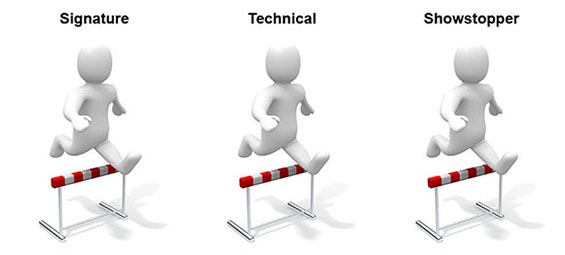Jack of all trades or master of some?
By Emma Armitage
Published 12 Jan 2018
I’m a huge fan of the Great British Bake Off. My favourite moment of last year’s series was the whimsical ‘chouxnicorns’ round, not because I’m one of the ever-growing number of people who love unicorns but because of the delightful play on words. However, the pivotal point of the series for most people was when the nation’s favourite, Liam, missed out on a place in the semi-final. The Twitter consensus was that Liam was unfairly penalised for making a single, albeit serious, mistake – serving up a raw Rum Nicky pastry in the technical challenge. Yet Kate survived despite the quality of her bakes being inconsistent. This situation neatly encapsulates a key issue in educational assessment: how to fairly reward students’ performances.
Failing someone because they underperformed in one area of an assessment, as Liam did in the technical challenge, can be described as a hurdles-based reward system. This is because it demands that a student (or baker) is at least reasonably competent in all aspects of the assessment (or every baking challenge – signature, technical and showstopper) to pass. So each piece of the assessment can be thought of as a hurdle that must be cleared.

Hurdles can lead to higher failure rates because students only have to fall short on a single area of the assessment to fail. Although this might seem a very harsh approach, it is necessary in some qualifications.
In the case of technical and vocational qualifications that are intended to prepare students for particular careers, it is important that students are competent in all aspects of the assessment as all the skills being tested will be required in their future role; you wouldn’t want a GP who was knowledgeable about brain functioning but lacked a basic understanding of how other organs functioned. To take a more everyday example, a learner driver who is excellent at parallel parking but persistently fails to use their indicators would not be considered a proficient road user. That is why the driving test demands competence on all the test criteria.
Academic qualifications like GCSEs and A-levels take a different approach to rewarding students. They are compensatory, which means that students’ grades are determined by their overall scores. Imagine that you and your friend both scored 150/200 marks in GCSE Psychology but you achieved those marks in different ways. You might have scored low marks on paper 3 but made up for that with high marks on papers 1 and 2. Your friend might have scored average marks on all three papers. You would both achieve the same grade based on demonstrating the same average ability in the subject. That grade, providing it was high enough, could then be used to gain entry to A-level courses, which require sufficient academic ability to cope with the demand of A-level study rather than a prescribed set of knowledge, skills and understanding.
Ultimately, the choice between hurdles and compensation depends on what the outcomes of the assessment will be used for. If we are certifying a GP’s ability to practice medicine, we are justified in wanting them to be competent in all areas. However, if we simply want to certify that a student knows enough about psychology to study it at A-level then it is sufficient for their GCSE grade to represent their average ability in the subject rather than precisely what he/she knows.
So what do Paul and Prue want from their bakers – to be reasonably competent in all areas, or to be a master bread-maker who produces a soggy meringue? (You might want to ponder where the 2017 winner, Sophie, lies on that continuum.) It all depends on what the judges see their winners doing in the future: opening a bakery that offers a wide selection of goods, or being a specialist in a few choice products.
Emma Armitage
Illustration courtesy of iStock.com/skvoor
Keywords
Related content
About our blog
Discover more about the work our researchers are doing to help improve and develop our assessments, expertise and resources.
Share this page
Connect with us
Email: research@aqa.org.uk
Work with us to advance education and enable students and teachers to reach their potential.